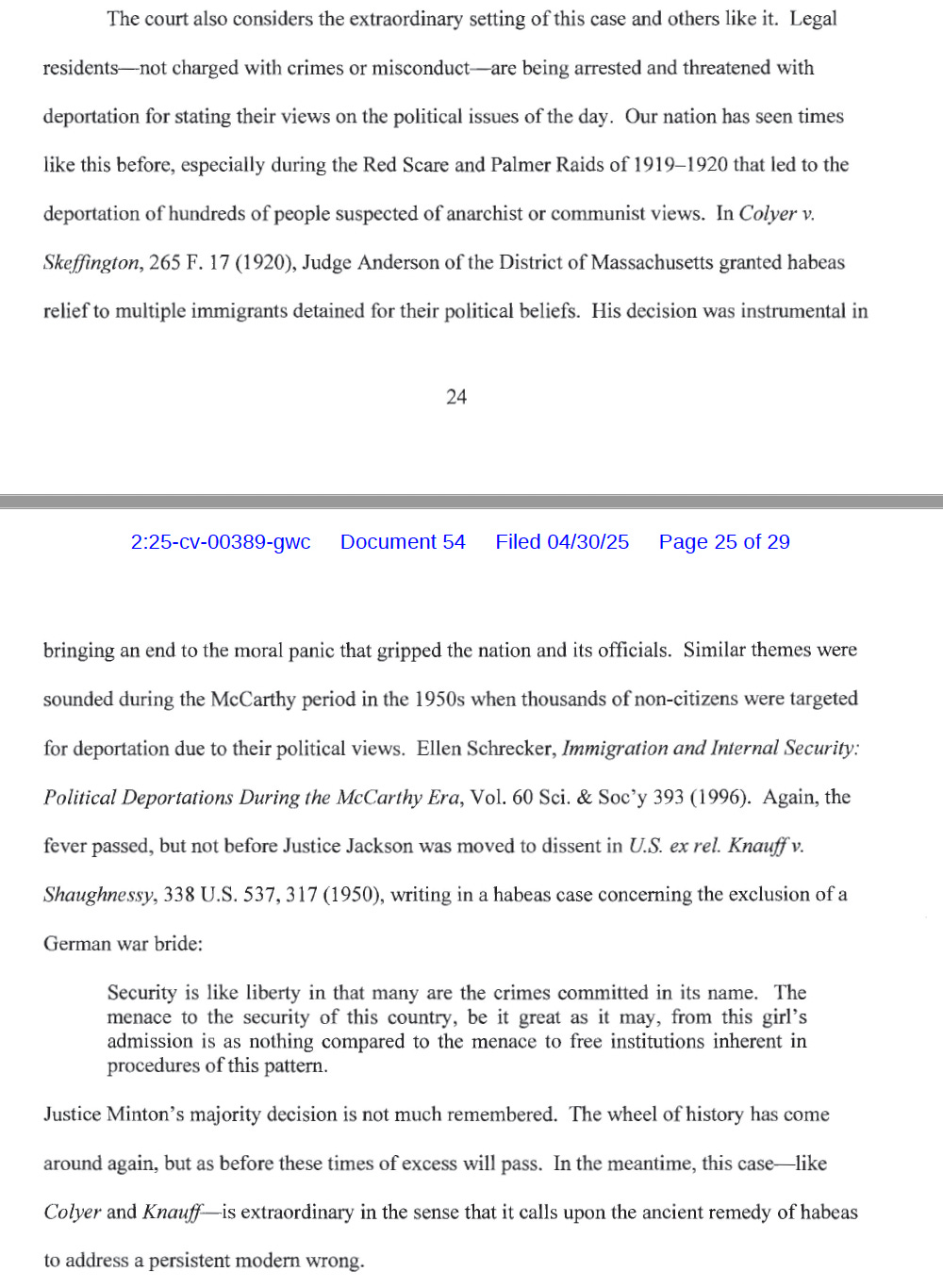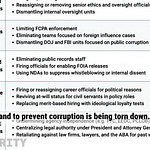Hi everyone -
Here’s a roundup of the most recent developments in litigation concerning the Trump administration’s executive actions.
Judges’ orders:
1. On Thursday: In an Alien Enemies Act case, J.A.V. v. Trump, Judge Fernando Rodriguez, a Trump appointee in the Southern District of Texas, issued a permanent injunction. As a final order on the merits, that decision now tees up the Fifth Circuit. Judge Rodriguez wrote:
“The historical record renders clear that the President’s invocation of the AEA [Alien Enemies Act] through the Proclamation exceeds the scope of the statute and is contrary to the plain, ordinary meaning of the statute’s terms.”
[Caveat: As I noted on Bluesky, I also see a problem in how Judge Rodriguez analyzed the “political question doctrine” – providing a roadmap for a White House acting in bad faith to overcome court review in writing up future AEA proclamations.]
2. On Thursday: In a case involving the dismantling of the Institute of Museum and Library Services, American Library Association v. Sonderling, Judge Richard Leon, a George W. Bush appointee, issued a temporary restraining order.
3. On Thursday night, in cases involving the administration’s defunding and dismantling global media organizations that provide news coverage to countries with limited press freedoms, the DC Circuit imposed an administrative stay which allows the government to continue to withhold funds from Radio Free Europe/Radio Liberty, Radio Free Asia and Middle East Broadcasting Networks until the court rules on the emergency appeal. At the same time, the DC Circuit ordered the administration to reinstate journalists at Voice of America and resume that media outlet’s news programming.
The DC Circuit notes: “The purpose of this administrative stay is to give the court sufficient opportunity to consider the emergency motions for stay pending appeal and should not be construed in any way as a ruling on the merits of those motions.”
4. On Wednesday, in Mahdawi v. Trump, one of the flagship cases involving detention and deportation of students who engaged in Gaza war protests, the district court ordered Mohsen Mahdawi released and he walked out of the courthouse. I expect that news item is widely known to readers. What’s not as widely known is the following passage in Judge Geoffrey Crawfor’s opinion, which appears written for a broad American audience and is well worth our attention:
5. On Wednesday, in the Abrego Garcia case, Judge Paula Xinis rejected the administration’s motion to further delay answering questions about the removal of Mr. Abrego Garcia and what steps the administration has taken to secure his release from El Salvador. The government’s response to all discovery requests is due Monday, May 5 and depositions of four officials must be completed by Friday, May 9.
In a following newsletter, I’ll identify the key questions for which I’m especially interested in seeing the government’s response.
New lawsuit:
On Thursday, a new lawsuit was filed against DOGE alleging the organization is unlawfully trying to dismantle the National Endowment for Humanities. The case is American Council of Learned Societies v. McDonald.
Major appeals:
Late Thursday: In a major case involving protections for hundreds of thousands of Venezuelan immigrants who have been permitted to stay in the United States without the threat of deportation under a program known as the Temporary Protected Status (TPS), the Trump administration appealed to the U.S. Supreme Court to allow the government to revoke those protections. The case is National TPS Alliance et al. v. Noem.
Background:
The district court decision
The Ninth Circuit decision denying the Government’s appeal
New video:
Folks might want to check out a looooong conversation I had with Tom Joscelyn over on my new YouTube channel. (I promise to keep future conversations shorter!) Below is a sample in which Tom and I discuss one of the most important analyses to date on Trump administration executive orders: Harold Hongju Koh and colleagues’ article, No, the President Cannot Issue Bills of Attainder. That short essay is also a great read for those wanting a rich insight into American history. You can also listen to an audio of Harold’s essay thanks to Just Security’s new website redesign.
A cool technical update:
As you may have gleaned from the above, one can now directly link to any case in the Just Security Litigation Tracker. Here’s the trick:
Use this URL (and insert the digits of the case number at the end (such as 00951 for Abrego Garcia) :
https://www.justsecurity.org/107087/tracker-litigation-legal-challenges-trump-administration/?js_filter=[CASENUMBER]
Thanks again for joining the conversation. If you appreciate this work, please subscribe to the YouTube channel, forward this newsletter to others who might find it useful, and feel free to send along any questions, comments or other feedback.
Stay in the know,
Ryan
TRANSCRIPT FOR ABOVE VIDEO
Ryan Goodman:
You and I both share an affection or a deep appreciation for one of the pieces that Jesse Critty published on the executive orders by Harold, Cohen, and Company. And Harold’s argument is one in which I think it alerts people both to the American history and then it alerts people to the constitutional issues that are being litigated.
The title of the piece—I was just bringing it up—is No, the President Cannot Issue Bills of Attainder. The “bills of attainder” idea is that we look back into U.S. history and the founding. A deep concern was not just Congress passing bills of attainder, as we all kind of learn in civics school and high school and the rest, but the president—that the president would have the power to target particular individuals, find them guilty, and then penalize them, including through depriving them of a livelihood, trying to destroy their ability to have a living and have clients and things like that.
And to me, that’s their argument. They say this is one of the frontal arguments against what we’re seeing—witnessing—coming out of the White House with these executive orders. And to me, it really speaks to the moment in a sense of understanding the kind of power that’s being accumulated in the White House that I assume most Americans, if you think about it, would not want that kind of authority ever granted to a single person—to go after their political enemies or personal enemies or people that they’re disgruntled with.
Which, in fact, you can just look at the very face of some of these executive orders, and they say exactly what the reason is. It’s like coming from Donald Trump’s personal diary as to particular individuals that he thinks—he ordered me in some of them.
Tom Jocelyn:
He actually says me!
Ryan Goodman:
Okay, I missed that. That’s great.
Tom Jocelyn:
Yeah, yeah.






